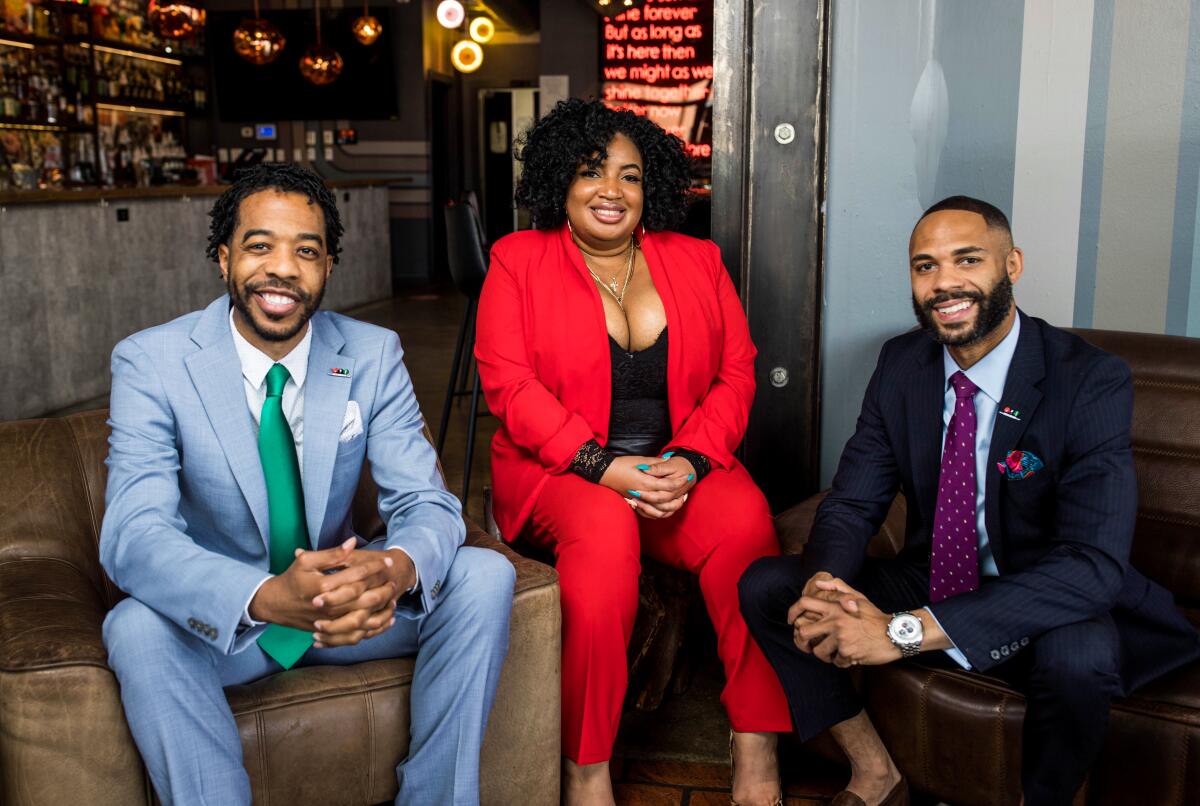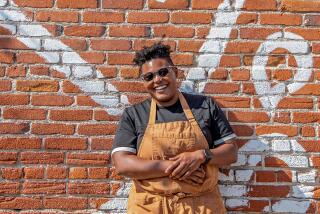Black Restaurant Week is back with a new grant program and a bigger reach

Warren Luckett, Falayn Ferrell and Derek Robinson want you to have a favorite Black-owned restaurant — just like you have a favorite spot for tacos or burgers or pasta.
To help, they founded Black Restaurant Week, a national event spotlighting Black-owned restaurants, bakeries, coffee shops and other culinary establishments where participants cook up special dishes, combos and prix fixe menus for one week of the year. The third Los Angeles iteration is scheduled for Aug. 6-15 and will feature new restaurants and food trucks, plus an expanded reach into more of Southern California — and a new grant program to help local business.
“We want knowing your favorite Black-owned restaurant to be the same as knowing your favorite sushi spot or favorite Italian restaurant,” said Luckett, who founded Black Restaurant Week in Houston in 2016. “We want it to be more accessible, and I think the more accessible it is, and the more natural awareness there is from the greater community, the more successful these restaurants are going to be in the long term.”
More than 75 restaurants participated in L.A. Black Restaurant Week in 2020. This year, the team, which is working with Jade Stevens of the Black Restaurant Coalition, expects that number will be higher, thanks to returning favorites and a number of new-to-the-event businesses signing on, including Deluxe 1717 in Pasadena, Island Breeze Jamaican Cuisine in Colton and Bossy Bundts in Carson. They also are working to expand into Riverside, San Bernardino and Orange counties. (Like last year, the event’s founders have waived the usual $200 registration fee to aid restaurants that might be struggling after 16 months of innumerable hardships and losses.)
While some restaurants will offer dine-in service, most of them will make their dishes available for delivery or takeout. Some will offer one-time specials, while others will offer deals. Sky’s Gourmet Tacos, for instance, which has two locations, will sell combos for two that shave between $7 and $9 off the restaurants’ usual prices. The list of participating restaurants can be found on the event’s map-based directory.
Black Restaurant Week also is spotlighting bartenders with Power of the Palate, a bracket-style virtual competition for Black mixologists nationwide, in which you can make the competitors’ recipes at home and vote for your favorites. (William Devon Jr. of Bestia is representing L.A.) The winner receives $5,000.
Toward the end of 2020, the team behind Black Restaurant Week established the Feed the Soul Foundation, a nonprofit that will annually award development grants of $10,000 to 25 Black culinary entrepreneurs and businesses.
In addition to the grants, the recipients also receive financial-literacy training, marketing-strategy tips and a six-month consultation program — which can include branding aid, beverage development and menu consultation.
Four of the program’s first grantees are in the Los Angeles area: salad pop-up Toss It Up; taco stalwart Taco Pete, which operates in South Los Angeles and downtown; plant-based doughnut-and-sweets shop LêBerry Bakery & Donut in Pasadena; and vegan restaurant and coffee shop Hot and Cool Cafe, with locations in Leimert Park and Canoga Park. Applications for 2022’s business grants will open in the fall.
But the professional guidance the grantees receive isn’t limited to the 25 winners. Luckett says all participants in Black Restaurant Week are encouraged to ask for business advice.
“What we’re really looking to do is provide [restaurants] with solutions,” he said. “A lot of times, these small-business owners don’t have the resources to market their business in addition to all the day-to-day operations that they have to do. So to come in with the [event] campaign or to get them press opportunities or just get them marketing assets — and get them the opportunity to apply for our foundation — for us, we want this to be a full kind of 365 campaign and partnership.”
Later this year, the founders hope to launch their long-planned digital marketplace, expanding the organization’s website to include a virtual shop for products by Black proprietors from across the country, stocking items such as bottled sauces, seasonings and other pantry goods.
Luckett, Ferrell and Robinson know there’s still a long way to go; in their first year of the grants program, they received more than 300 applicants. More are expected as word about the nonprofit spreads.
“We know there’s a huge, huge, huge need for these resources,” Luckett said. “So we’re going to continue to do this for as long as we’re allowed.”
More to Read
Eat your way across L.A.
Get our weekly Tasting Notes newsletter for reviews, news and more.
You may occasionally receive promotional content from the Los Angeles Times.











